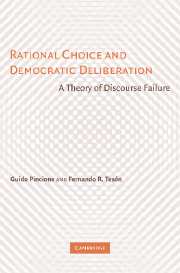Book contents
- Frontmatter
- Contents
- Preface
- Acknowledgments
- 1 Introduction
- 2 The Epistemic Argument for Deliberation
- 3 The Rational Choice Framework
- 4 The Resilience of Discourse Failure
- 5 Symbolism in Political Argument
- 6 Discourse Failure and Political Morality
- 7 Non-Epistemic Defenses of Deliberation
- 8 Deliberation, Consent, and Majority Rule
- 9 Overcoming Discourse Failure: Voluntary Communities
- Index
4 - The Resilience of Discourse Failure
Published online by Cambridge University Press: 05 May 2010
- Frontmatter
- Contents
- Preface
- Acknowledgments
- 1 Introduction
- 2 The Epistemic Argument for Deliberation
- 3 The Rational Choice Framework
- 4 The Resilience of Discourse Failure
- 5 Symbolism in Political Argument
- 6 Discourse Failure and Political Morality
- 7 Non-Epistemic Defenses of Deliberation
- 8 Deliberation, Consent, and Majority Rule
- 9 Overcoming Discourse Failure: Voluntary Communities
- Index
Summary
Reliable Social Science and Opacity
We have seen why ordinary citizens will hold political views at variance with the findings of reliable social theories. People believe vivid explanations of how society works, whereas many reliable social theories provide opaque explanations. Most citizens are doomed to ignorance and error by the dynamics of political discourse. Politicians and rent seekers will take advantage of this, in turn fueling discourse failure. This situation is fatal to theories of deliberative democracy.
When is a social theory reliable? While the conditions for theoretical reliability are much debated in the philosophy of science, for our purposes it suffices to say that a theory is reliable when the relevant research community generally accepts it. Identifying the relevant research community in terms of the methodology used can nevertheless be tricky. For example, writers differ about the scientific status of psychoanalysis, or about the features that make astronomy a science – in contrast to astrology, for example. Many such controversies turn on views about the proper methods of scientific inquiry. Of course, were we to probe into such questions we would run the risk of reintroducing the very problem that we hope to avoid – how to persuade skeptics that some branches of scholarship are more reliable than others.
- Type
- Chapter
- Information
- Rational Choice and Democratic DeliberationA Theory of Discourse Failure, pp. 87 - 122Publisher: Cambridge University PressPrint publication year: 2006



